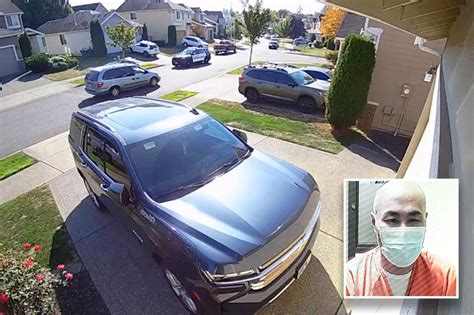
A frantic 911 call from a woman in Scottsdale, Arizona, detailing a terrifying encounter with a wolf hybrid owned by former astronaut Scott Kelly, has ignited public concern and prompted an investigation by animal control officials. The woman, identified as Ericka Podestá, can be heard pleading for help, stating, “I can’t live like this,” as she described being trapped in her home due to the animal’s presence and aggressive behavior.
The incident occurred on January 29th and involved Podestá’s escalating fear and distress over the wolf hybrid, named “Nova,” belonging to Kelly and his wife, Amiko Kauderer. According to police reports and the 911 call transcript, Podestá expressed feeling imprisoned in her own residence, fearing for her safety and the safety of others in the neighborhood. The case has raised questions about the responsibilities of owning potentially dangerous animals in residential areas and the adequacy of existing regulations.
Details of the 911 Call and Police Report
The 911 call, lasting several minutes, captures Podestá’s mounting anxiety. She described Nova as being “right outside my house,” preventing her from leaving safely. Podestá’s fear stemmed from previous encounters with the animal, which she characterized as exhibiting aggressive tendencies. She mentioned that she had previously contacted animal control regarding Nova’s behavior but felt that the situation was not being adequately addressed.
In the call, Podestá can be heard saying, “I’m trapped in my house. I can’t leave,” emphasizing the level of distress and confinement she felt due to Nova’s presence. She further stated, “I’m afraid it’s going to attack me,” revealing the severity of her fear for her personal safety. She also expressed concern for the safety of others in the neighborhood, particularly children and individuals walking their pets.
Police reports corroborate Podestá’s account, documenting that officers responded to her residence following the 911 call. The reports indicate that officers observed Nova in the vicinity of Podestá’s property and noted the animal’s size and demeanor. While Nova was reportedly contained when officers arrived, the incident highlighted the potential risk posed by the animal’s presence in a residential area.
Scott Kelly’s Response and Explanation
Scott Kelly, a retired NASA astronaut known for his year-long mission aboard the International Space Station, and his wife, Amiko Kauderer, have acknowledged owning Nova, describing her as a high-content wolf hybrid. In response to the incident and the public outcry, Kelly issued a statement defending Nova and attempting to clarify the circumstances surrounding the 911 call.
Kelly stated that Nova is “not aggressive” and that she is “well-socialized” with people and other animals. He attributed the incident to Nova’s natural curiosity and territorial instincts, suggesting that her presence near Podestá’s property was not indicative of malicious intent. He also emphasized that Nova is properly contained within their property, typically residing in a secure enclosure.
However, Kelly acknowledged that Nova had previously escaped from her enclosure on a few occasions, prompting concerns from neighbors. He attributed these escapes to accidental breaches in the fencing and emphasized that he and Kauderer have taken steps to reinforce the enclosure and prevent future incidents.
Kelly also addressed the 911 call directly, suggesting that Podestá’s reaction was an overreaction. He argued that Nova posed no real threat to Podestá’s safety and that her fear was based on a misunderstanding of the animal’s behavior. He stated that he and Kauderer are committed to being responsible pet owners and ensuring that Nova does not pose a danger to the community.
Despite Kelly’s assurances, the incident has fueled debate about the appropriateness of owning wolf hybrids in residential areas. Critics argue that these animals, due to their inherent wild instincts, pose an unacceptable risk to public safety, regardless of how well-socialized or contained they may be.
Legal and Regulatory Context
The legal and regulatory framework surrounding the ownership of wolf hybrids varies significantly across different jurisdictions. Some states and municipalities have outright bans on owning wolf hybrids, considering them inherently dangerous animals. Other jurisdictions have regulations that require owners to obtain permits, maintain specific housing conditions, and adhere to strict safety protocols.
In Arizona, where the incident occurred, the laws regarding wolf hybrid ownership are somewhat ambiguous. While there is no statewide ban on owning wolf hybrids, local ordinances may impose restrictions or requirements. Scottsdale, the city where Kelly and Podestá reside, does not have a specific ban on wolf hybrids, but it does have regulations regarding dangerous animals.
Under Scottsdale’s city code, an animal can be declared “dangerous” if it has a history of aggressive behavior or poses a threat to public safety. If an animal is deemed dangerous, the owner may be required to take specific measures to mitigate the risk, such as erecting secure fencing, muzzling the animal in public, and obtaining liability insurance.
Animal control officials in Scottsdale are currently investigating the incident involving Nova to determine whether she meets the criteria for being declared a dangerous animal. If Nova is deemed dangerous, Kelly and Kauderer could face legal consequences, including fines, restrictions on owning the animal, or even the possibility of having Nova impounded.
Community Reaction and Concerns
The incident has sparked widespread concern among residents of Scottsdale, particularly those living in close proximity to Kelly and Kauderer’s property. Many neighbors have expressed fear and anxiety about Nova’s presence, citing concerns about the animal’s potential for aggression and the risk of future escapes.
Some residents have voiced their concerns at public meetings and on social media, demanding that city officials take action to address the situation. They have called for stricter regulations on wolf hybrid ownership and for increased enforcement of existing animal control laws.
Others have defended Kelly and Kauderer, arguing that they are responsible pet owners who have taken appropriate measures to contain and manage Nova. They contend that Nova is not inherently dangerous and that the incident was an isolated event that should not be used to justify a ban on wolf hybrid ownership.
The debate over Nova’s presence in the community has highlighted the complex and often conflicting perspectives on the issue of owning potentially dangerous animals in residential areas. It has also raised questions about the balance between individual rights and the collective responsibility to ensure public safety.
Expert Opinions on Wolf Hybrid Behavior
Animal behavior experts caution that wolf hybrids, even those raised in domestic environments, retain inherent wild instincts that can make them unpredictable and potentially dangerous. These instincts include a strong prey drive, territorial aggression, and a tendency to roam.
According to experts, wolf hybrids require specialized care and handling that goes beyond the capabilities of most pet owners. They need secure enclosures, extensive socialization, and consistent training to manage their behavior and prevent them from posing a threat to others.
Furthermore, experts emphasize that it is difficult to predict the behavior of a wolf hybrid, even with proper training and socialization. Their genetic makeup makes them more prone to certain behaviors than domestic dogs, and their reactions to stimuli can be unpredictable.
The American Veterinary Medical Association (AVMA) does not endorse the ownership of wolf hybrids, citing concerns about public safety and animal welfare. The AVMA recommends that state and local governments enact regulations to restrict or prohibit the ownership of wolf hybrids.
Ethical Considerations of Owning Wolf Hybrids
The ownership of wolf hybrids raises a number of ethical considerations, including the potential for animal suffering, the risk to public safety, and the impact on wild wolf populations.
Wolf hybrids often experience health and behavioral problems due to their genetic makeup and the challenges of adapting to a domestic environment. They may suffer from anxiety, aggression, and difficulty bonding with humans.
The risk to public safety is another major ethical concern. Wolf hybrids have the potential to inflict serious injuries on humans and other animals, particularly if they are not properly contained or managed.
Furthermore, the breeding of wolf hybrids can have a negative impact on wild wolf populations. Some breeders capture wild wolves to produce hybrids, which can disrupt wolf ecosystems and contribute to the decline of wild wolf populations.
Conclusion
The incident involving Ericka Podestá and Scott Kelly’s wolf hybrid, Nova, has brought to light the complex issues surrounding the ownership of potentially dangerous animals in residential areas. The 911 call and subsequent investigation have raised questions about the responsibilities of pet owners, the adequacy of existing regulations, and the balance between individual rights and public safety.
While Kelly maintains that Nova is not aggressive and that he and Kauderer are responsible pet owners, the incident has fueled concerns among neighbors and sparked a debate about the appropriateness of owning wolf hybrids in residential settings.
Animal control officials in Scottsdale are continuing to investigate the incident and will determine whether Nova meets the criteria for being declared a dangerous animal. The outcome of the investigation could have significant implications for Kelly and Kauderer, as well as for the future of wolf hybrid ownership in Scottsdale.
The case serves as a reminder of the importance of responsible pet ownership and the need for clear and comprehensive regulations to protect public safety and animal welfare. It also highlights the ethical considerations surrounding the ownership of potentially dangerous animals and the need for careful consideration before bringing such animals into a domestic environment. The incident continues to be a focal point of discussion regarding animal rights and community safety in Scottsdale.
Frequently Asked Questions (FAQ)
-
What exactly is a wolf hybrid?
- A wolf hybrid is an animal that is a result of breeding between a domestic dog (Canis lupus familiaris) and a gray wolf (Canis lupus). The resulting offspring carries genetic material from both species, leading to a combination of traits from both dogs and wolves. Wolf hybrids can vary greatly in appearance, behavior, and temperament depending on the percentage of wolf and dog ancestry.
-
Are wolf hybrids legal to own in all states?
- No, the legality of owning wolf hybrids varies significantly by state and even by local jurisdictions (cities, counties). Some states have outright bans on owning wolf hybrids, considering them inherently dangerous animals. Other states have regulations that require permits, specific housing conditions, and adherence to strict safety protocols. In some areas, wolf hybrids are legal with no specific regulations. Arizona, where the incident occurred, has no statewide ban, but local ordinances can apply.
-
What are the potential dangers of owning a wolf hybrid?
- Wolf hybrids retain many of the natural instincts of wolves, including a strong prey drive, territorial behavior, and the potential for aggression. Even when raised in a domestic environment, these instincts can make them unpredictable and potentially dangerous, especially around small children, pets, or strangers. They require specialized handling and secure containment. The American Veterinary Medical Association (AVMA) does not support owning wolf hybrids because of public safety and animal welfare concerns.
-
What steps can be taken to ensure the safety of the community when a neighbor owns a potentially dangerous animal like a wolf hybrid?
- Several steps can be taken:
- Know Your Local Laws: Familiarize yourself with local ordinances and regulations regarding animal ownership, particularly those concerning dangerous or exotic animals.
- Report Concerns: If you observe behavior that concerns you or suspect violations of local ordinances, report them to your local animal control or law enforcement agency. Document dates, times, descriptions, and photos or videos, if possible.
- Communicate with Owners: If you feel comfortable, calmly communicate your concerns to the animal owner directly. Sometimes, open communication can lead to mutually agreeable solutions.
- Advocate for Stricter Regulations: Attend local government meetings and advocate for stricter regulations and enforcement of animal control laws.
- Neighborhood Watch: Organize a neighborhood watch program to monitor animal activity and report any suspicious or dangerous behavior promptly.
- Personal Safety Measures: Take precautions, such as keeping small children and pets supervised when outdoors, carrying a whistle or deterrent spray, and avoiding direct interaction with the animal.
- Seek Legal Advice: If you believe your safety or property is at risk, consult with an attorney to explore legal options, such as seeking a restraining order or filing a civil lawsuit.
- Several steps can be taken:
-
What responsibility do animal control agencies have in situations involving wolf hybrids or other potentially dangerous animals?
- Animal control agencies have a primary responsibility to ensure public safety and enforce local animal control laws and regulations. Their responsibilities typically include:
- Investigating Complaints: Responding to and investigating complaints about animal behavior, bites, or violations of animal control laws.
- Enforcing Regulations: Enforcing ordinances related to animal licensing, leash laws, animal cruelty, and the keeping of dangerous animals.
- Animal Apprehension and Quarantine: Apprehending stray, abandoned, or dangerous animals and quarantining animals that have bitten humans to monitor for rabies.
- Animal Evaluation: Assessing an animal’s behavior to determine if it poses a threat to public safety. This may involve observation, interviews with witnesses, and consultations with animal behavior experts.
- Issuing Warnings and Citations: Issuing warnings and citations for violations of animal control laws.
- Animal Removal: Removing animals from homes or properties when owners are unable or unwilling to provide adequate care, or when the animal poses an immediate threat to public safety.
- Education and Outreach: Providing education and outreach to the community about responsible pet ownership, animal safety, and local animal control laws.
- Court Testimony: Providing expert testimony in court cases involving animal-related issues.
- Collaboration with Other Agencies: Collaborating with other agencies, such as law enforcement and public health departments, to address animal-related issues that impact public safety and welfare.
- Animal control agencies have a primary responsibility to ensure public safety and enforce local animal control laws and regulations. Their responsibilities typically include:









